Entrepreneurial Ventures: Types, Impact, and Mindset Exploration
VerifiedAdded on 2022/11/24
|15
|4040
|2
Report
AI Summary
This report provides a comprehensive overview of entrepreneurship and small business management, beginning with an introduction to entrepreneurial ventures, including large company, small business, scalable start-ups, and social entrepreneurship. It examines the similarities and differences between these ventures and analyzes the significant positive impact of micro and small businesses on the economy, particularly in the context of Brexit. The report further explores the characteristics, traits, and skills of successful entrepreneurs like Mark Zuckerberg and Steve Jobs, differentiating them from typical business managers. Finally, it considers how an individual's background and experience can either foster or hinder entrepreneurial endeavors. Desklib offers this assignment solution and many other resources for students.

Entrepreneurship
And small business
management
And small business
management
Paraphrase This Document
Need a fresh take? Get an instant paraphrase of this document with our AI Paraphraser

1
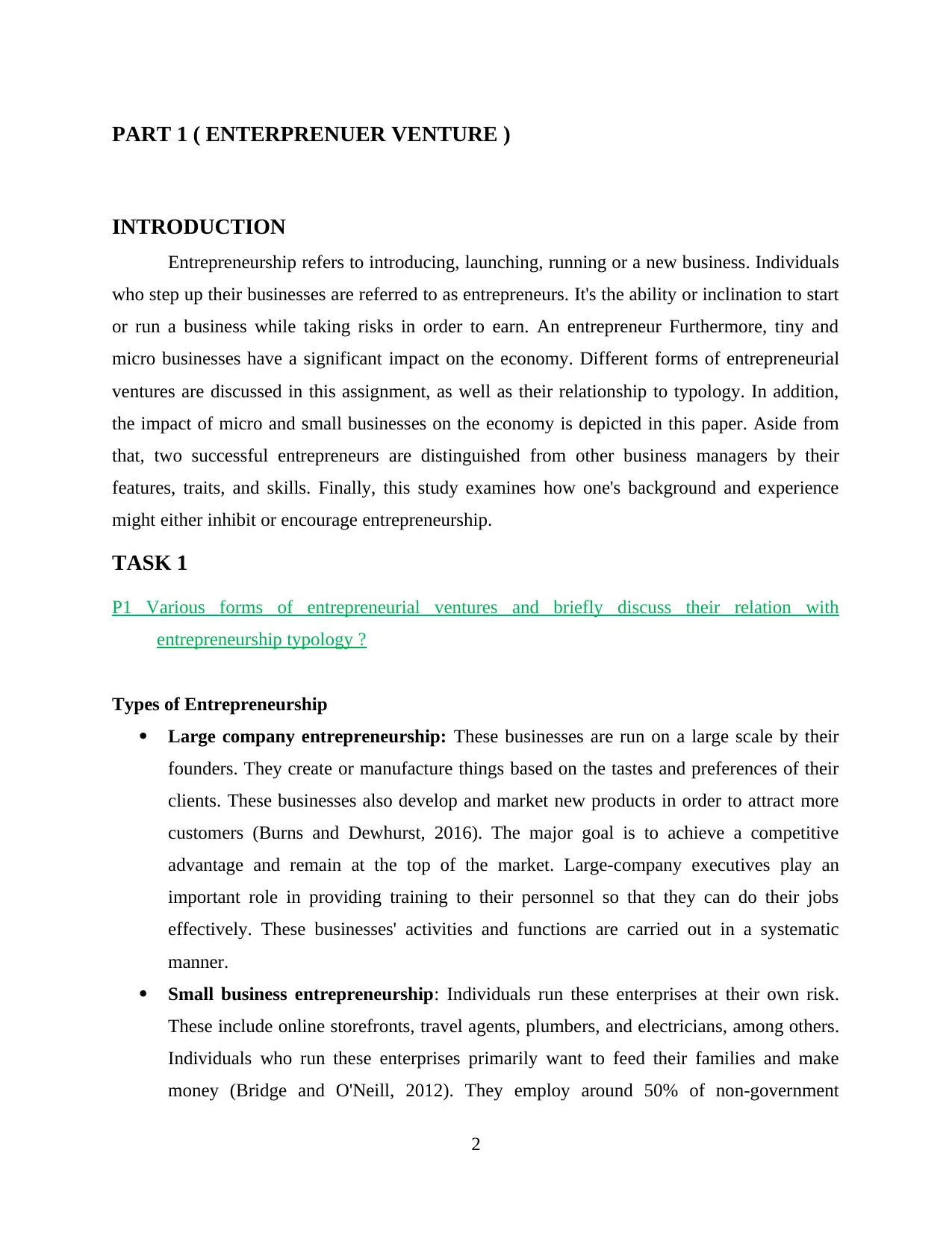
PART 1 ( ENTERPRENUER VENTURE )
INTRODUCTION
Entrepreneurship refers to introducing, launching, running or a new business. Individuals
who step up their businesses are referred to as entrepreneurs. It's the ability or inclination to start
or run a business while taking risks in order to earn. An entrepreneur Furthermore, tiny and
micro businesses have a significant impact on the economy. Different forms of entrepreneurial
ventures are discussed in this assignment, as well as their relationship to typology. In addition,
the impact of micro and small businesses on the economy is depicted in this paper. Aside from
that, two successful entrepreneurs are distinguished from other business managers by their
features, traits, and skills. Finally, this study examines how one's background and experience
might either inhibit or encourage entrepreneurship.
TASK 1
P1 Various forms of entrepreneurial ventures and briefly discuss their relation with
entrepreneurship typology ?
Types of Entrepreneurship
Large company entrepreneurship: These businesses are run on a large scale by their
founders. They create or manufacture things based on the tastes and preferences of their
clients. These businesses also develop and market new products in order to attract more
customers (Burns and Dewhurst, 2016). The major goal is to achieve a competitive
advantage and remain at the top of the market. Large-company executives play an
important role in providing training to their personnel so that they can do their jobs
effectively. These businesses' activities and functions are carried out in a systematic
manner.
Small business entrepreneurship: Individuals run these enterprises at their own risk.
These include online storefronts, travel agents, plumbers, and electricians, among others.
Individuals who run these enterprises primarily want to feed their families and make
money (Bridge and O'Neill, 2012). They employ around 50% of non-government
2
INTRODUCTION
Entrepreneurship refers to introducing, launching, running or a new business. Individuals
who step up their businesses are referred to as entrepreneurs. It's the ability or inclination to start
or run a business while taking risks in order to earn. An entrepreneur Furthermore, tiny and
micro businesses have a significant impact on the economy. Different forms of entrepreneurial
ventures are discussed in this assignment, as well as their relationship to typology. In addition,
the impact of micro and small businesses on the economy is depicted in this paper. Aside from
that, two successful entrepreneurs are distinguished from other business managers by their
features, traits, and skills. Finally, this study examines how one's background and experience
might either inhibit or encourage entrepreneurship.
TASK 1
P1 Various forms of entrepreneurial ventures and briefly discuss their relation with
entrepreneurship typology ?
Types of Entrepreneurship
Large company entrepreneurship: These businesses are run on a large scale by their
founders. They create or manufacture things based on the tastes and preferences of their
clients. These businesses also develop and market new products in order to attract more
customers (Burns and Dewhurst, 2016). The major goal is to achieve a competitive
advantage and remain at the top of the market. Large-company executives play an
important role in providing training to their personnel so that they can do their jobs
effectively. These businesses' activities and functions are carried out in a systematic
manner.
Small business entrepreneurship: Individuals run these enterprises at their own risk.
These include online storefronts, travel agents, plumbers, and electricians, among others.
Individuals who run these enterprises primarily want to feed their families and make
money (Bridge and O'Neill, 2012). They employ around 50% of non-government
2
⊘ This is a preview!⊘
Do you want full access?
Subscribe today to unlock all pages.

Trusted by 1+ million students worldwide
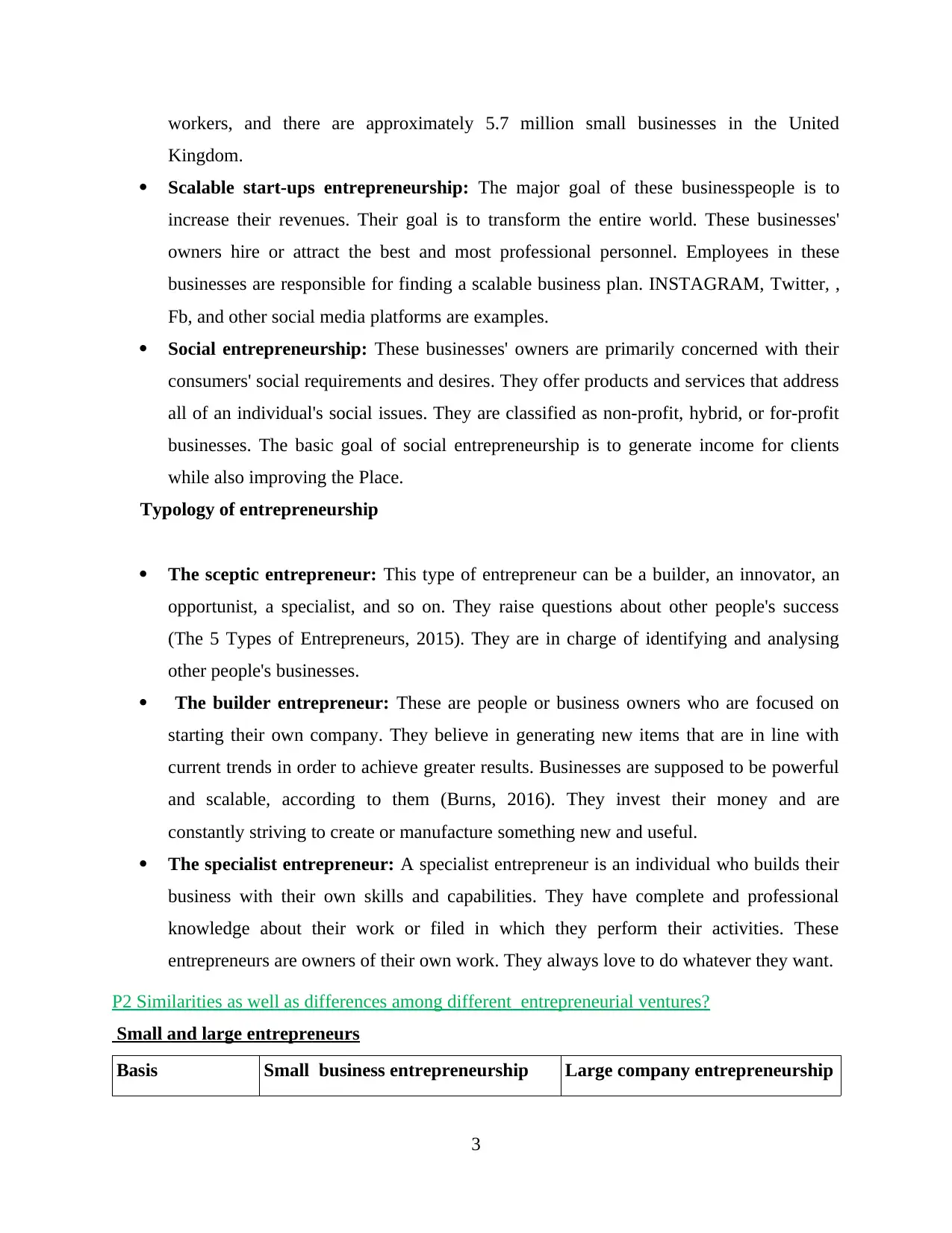
workers, and there are approximately 5.7 million small businesses in the United
Kingdom.
Scalable start-ups entrepreneurship: The major goal of these businesspeople is to
increase their revenues. Their goal is to transform the entire world. These businesses'
owners hire or attract the best and most professional personnel. Employees in these
businesses are responsible for finding a scalable business plan. INSTAGRAM, Twitter, ,
Fb, and other social media platforms are examples.
Social entrepreneurship: These businesses' owners are primarily concerned with their
consumers' social requirements and desires. They offer products and services that address
all of an individual's social issues. They are classified as non-profit, hybrid, or for-profit
businesses. The basic goal of social entrepreneurship is to generate income for clients
while also improving the Place.
Typology of entrepreneurship
The sceptic entrepreneur: This type of entrepreneur can be a builder, an innovator, an
opportunist, a specialist, and so on. They raise questions about other people's success
(The 5 Types of Entrepreneurs, 2015). They are in charge of identifying and analysing
other people's businesses.
The builder entrepreneur: These are people or business owners who are focused on
starting their own company. They believe in generating new items that are in line with
current trends in order to achieve greater results. Businesses are supposed to be powerful
and scalable, according to them (Burns, 2016). They invest their money and are
constantly striving to create or manufacture something new and useful.
The specialist entrepreneur: A specialist entrepreneur is an individual who builds their
business with their own skills and capabilities. They have complete and professional
knowledge about their work or filed in which they perform their activities. These
entrepreneurs are owners of their own work. They always love to do whatever they want.
P2 Similarities as well as differences among different entrepreneurial ventures?
Small and large entrepreneurs
Basis Small business entrepreneurship Large company entrepreneurship
3
Kingdom.
Scalable start-ups entrepreneurship: The major goal of these businesspeople is to
increase their revenues. Their goal is to transform the entire world. These businesses'
owners hire or attract the best and most professional personnel. Employees in these
businesses are responsible for finding a scalable business plan. INSTAGRAM, Twitter, ,
Fb, and other social media platforms are examples.
Social entrepreneurship: These businesses' owners are primarily concerned with their
consumers' social requirements and desires. They offer products and services that address
all of an individual's social issues. They are classified as non-profit, hybrid, or for-profit
businesses. The basic goal of social entrepreneurship is to generate income for clients
while also improving the Place.
Typology of entrepreneurship
The sceptic entrepreneur: This type of entrepreneur can be a builder, an innovator, an
opportunist, a specialist, and so on. They raise questions about other people's success
(The 5 Types of Entrepreneurs, 2015). They are in charge of identifying and analysing
other people's businesses.
The builder entrepreneur: These are people or business owners who are focused on
starting their own company. They believe in generating new items that are in line with
current trends in order to achieve greater results. Businesses are supposed to be powerful
and scalable, according to them (Burns, 2016). They invest their money and are
constantly striving to create or manufacture something new and useful.
The specialist entrepreneur: A specialist entrepreneur is an individual who builds their
business with their own skills and capabilities. They have complete and professional
knowledge about their work or filed in which they perform their activities. These
entrepreneurs are owners of their own work. They always love to do whatever they want.
P2 Similarities as well as differences among different entrepreneurial ventures?
Small and large entrepreneurs
Basis Small business entrepreneurship Large company entrepreneurship
3
Paraphrase This Document
Need a fresh take? Get an instant paraphrase of this document with our AI Paraphraser
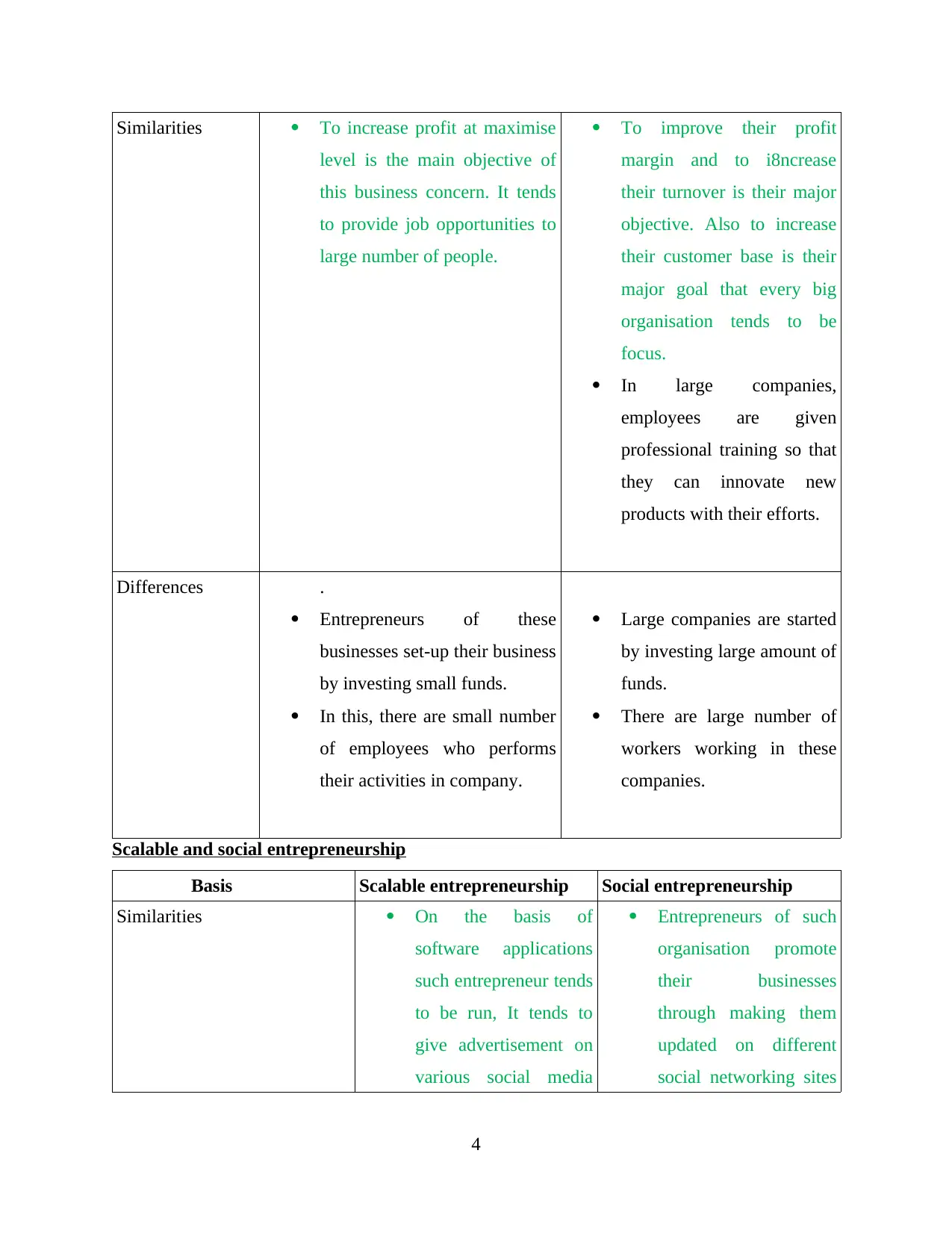
Similarities To increase profit at maximise
level is the main objective of
this business concern. It tends
to provide job opportunities to
large number of people.
To improve their profit
margin and to i8ncrease
their turnover is their major
objective. Also to increase
their customer base is their
major goal that every big
organisation tends to be
focus.
In large companies,
employees are given
professional training so that
they can innovate new
products with their efforts.
Differences .
Entrepreneurs of these
businesses set-up their business
by investing small funds.
In this, there are small number
of employees who performs
their activities in company.
Large companies are started
by investing large amount of
funds.
There are large number of
workers working in these
companies.
Scalable and social entrepreneurship
Basis Scalable entrepreneurship Social entrepreneurship
Similarities On the basis of
software applications
such entrepreneur tends
to be run, It tends to
give advertisement on
various social media
Entrepreneurs of such
organisation promote
their businesses
through making them
updated on different
social networking sites
4
level is the main objective of
this business concern. It tends
to provide job opportunities to
large number of people.
To improve their profit
margin and to i8ncrease
their turnover is their major
objective. Also to increase
their customer base is their
major goal that every big
organisation tends to be
focus.
In large companies,
employees are given
professional training so that
they can innovate new
products with their efforts.
Differences .
Entrepreneurs of these
businesses set-up their business
by investing small funds.
In this, there are small number
of employees who performs
their activities in company.
Large companies are started
by investing large amount of
funds.
There are large number of
workers working in these
companies.
Scalable and social entrepreneurship
Basis Scalable entrepreneurship Social entrepreneurship
Similarities On the basis of
software applications
such entrepreneur tends
to be run, It tends to
give advertisement on
various social media
Entrepreneurs of such
organisation promote
their businesses
through making them
updated on different
social networking sites
4
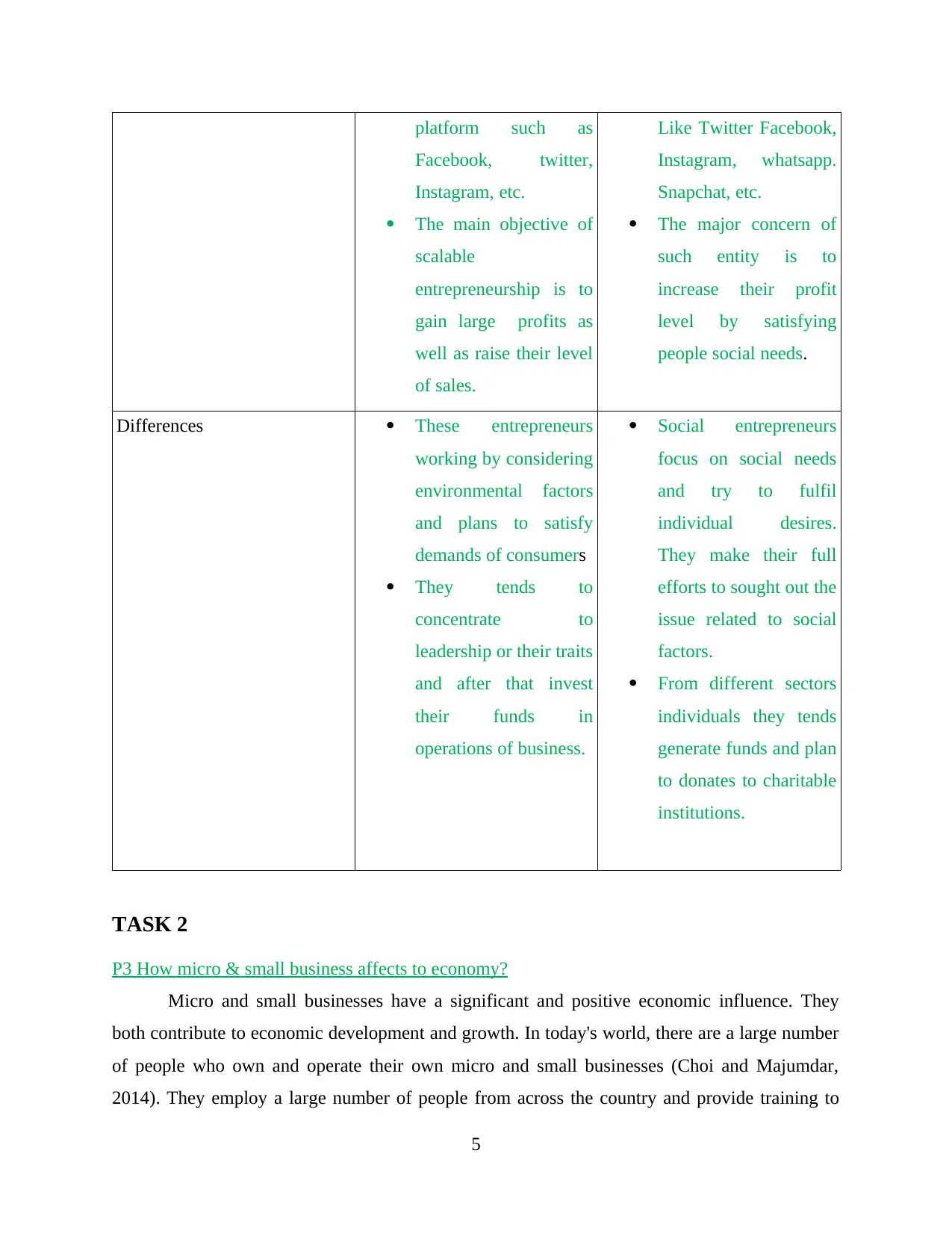
platform such as
Facebook, twitter,
Instagram, etc.
The main objective of
scalable
entrepreneurship is to
gain large profits as
well as raise their level
of sales.
Like Twitter Facebook,
Instagram, whatsapp.
Snapchat, etc.
The major concern of
such entity is to
increase their profit
level by satisfying
people social needs.
Differences These entrepreneurs
working by considering
environmental factors
and plans to satisfy
demands of consumers
They tends to
concentrate to
leadership or their traits
and after that invest
their funds in
operations of business.
Social entrepreneurs
focus on social needs
and try to fulfil
individual desires.
They make their full
efforts to sought out the
issue related to social
factors.
From different sectors
individuals they tends
generate funds and plan
to donates to charitable
institutions.
TASK 2
P3 How micro & small business affects to economy?
Micro and small businesses have a significant and positive economic influence. They
both contribute to economic development and growth. In today's world, there are a large number
of people who own and operate their own micro and small businesses (Choi and Majumdar,
2014). They employ a large number of people from across the country and provide training to
5
Facebook, twitter,
Instagram, etc.
The main objective of
scalable
entrepreneurship is to
gain large profits as
well as raise their level
of sales.
Like Twitter Facebook,
Instagram, whatsapp.
Snapchat, etc.
The major concern of
such entity is to
increase their profit
level by satisfying
people social needs.
Differences These entrepreneurs
working by considering
environmental factors
and plans to satisfy
demands of consumers
They tends to
concentrate to
leadership or their traits
and after that invest
their funds in
operations of business.
Social entrepreneurs
focus on social needs
and try to fulfil
individual desires.
They make their full
efforts to sought out the
issue related to social
factors.
From different sectors
individuals they tends
generate funds and plan
to donates to charitable
institutions.
TASK 2
P3 How micro & small business affects to economy?
Micro and small businesses have a significant and positive economic influence. They
both contribute to economic development and growth. In today's world, there are a large number
of people who own and operate their own micro and small businesses (Choi and Majumdar,
2014). They employ a large number of people from across the country and provide training to
5
⊘ This is a preview!⊘
Do you want full access?
Subscribe today to unlock all pages.

Trusted by 1+ million students worldwide
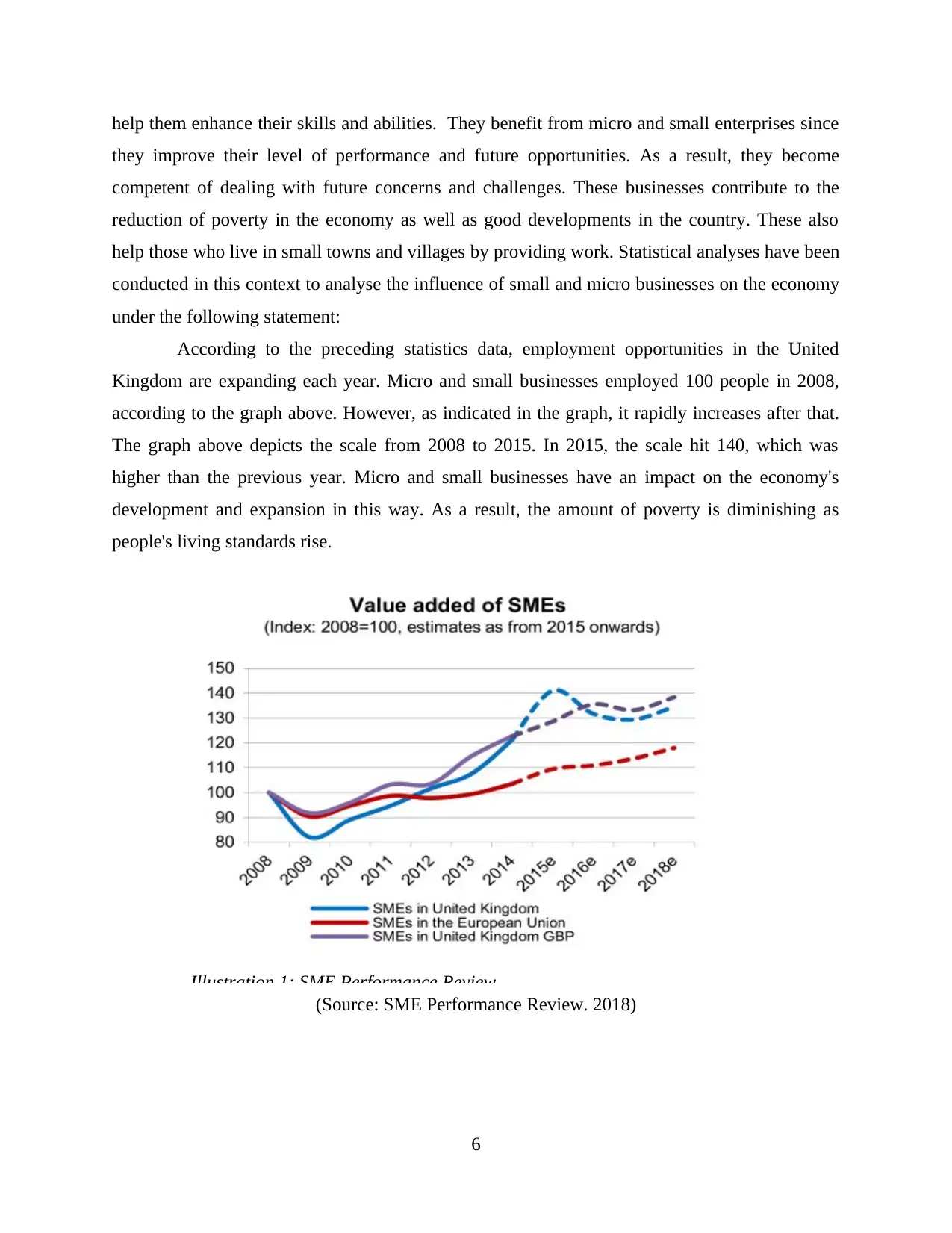
help them enhance their skills and abilities. They benefit from micro and small enterprises since
they improve their level of performance and future opportunities. As a result, they become
competent of dealing with future concerns and challenges. These businesses contribute to the
reduction of poverty in the economy as well as good developments in the country. These also
help those who live in small towns and villages by providing work. Statistical analyses have been
conducted in this context to analyse the influence of small and micro businesses on the economy
under the following statement:
According to the preceding statistics data, employment opportunities in the United
Kingdom are expanding each year. Micro and small businesses employed 100 people in 2008,
according to the graph above. However, as indicated in the graph, it rapidly increases after that.
The graph above depicts the scale from 2008 to 2015. In 2015, the scale hit 140, which was
higher than the previous year. Micro and small businesses have an impact on the economy's
development and expansion in this way. As a result, the amount of poverty is diminishing as
people's living standards rise.
(Source: SME Performance Review. 2018)
6
Illustration 1: SME Performance Review
they improve their level of performance and future opportunities. As a result, they become
competent of dealing with future concerns and challenges. These businesses contribute to the
reduction of poverty in the economy as well as good developments in the country. These also
help those who live in small towns and villages by providing work. Statistical analyses have been
conducted in this context to analyse the influence of small and micro businesses on the economy
under the following statement:
According to the preceding statistics data, employment opportunities in the United
Kingdom are expanding each year. Micro and small businesses employed 100 people in 2008,
according to the graph above. However, as indicated in the graph, it rapidly increases after that.
The graph above depicts the scale from 2008 to 2015. In 2015, the scale hit 140, which was
higher than the previous year. Micro and small businesses have an impact on the economy's
development and expansion in this way. As a result, the amount of poverty is diminishing as
people's living standards rise.
(Source: SME Performance Review. 2018)
6
Illustration 1: SME Performance Review
Paraphrase This Document
Need a fresh take? Get an instant paraphrase of this document with our AI Paraphraser
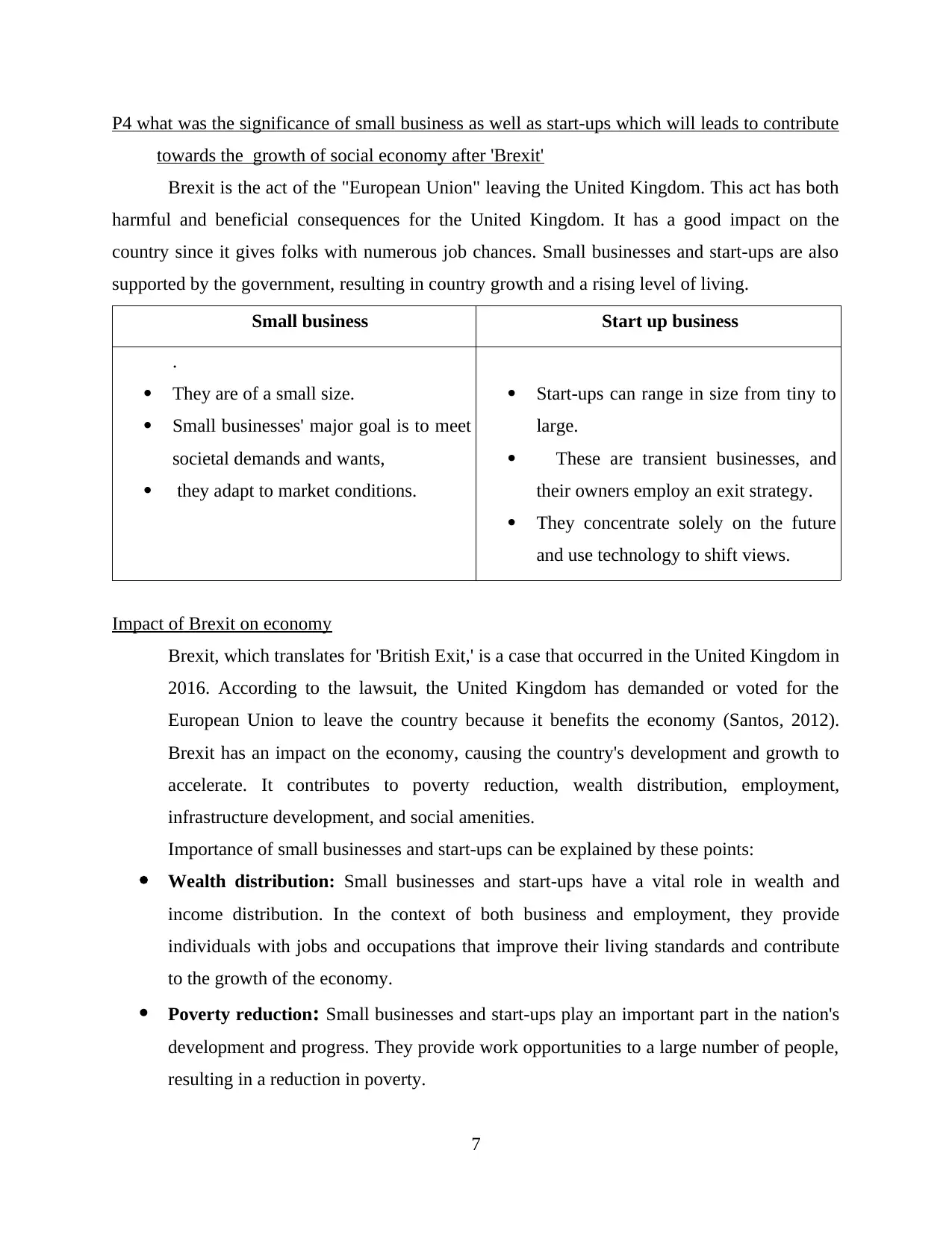
P4 what was the significance of small business as well as start-ups which will leads to contribute
towards the growth of social economy after 'Brexit'
Brexit is the act of the "European Union" leaving the United Kingdom. This act has both
harmful and beneficial consequences for the United Kingdom. It has a good impact on the
country since it gives folks with numerous job chances. Small businesses and start-ups are also
supported by the government, resulting in country growth and a rising level of living.
Small business Start up business
.
They are of a small size.
Small businesses' major goal is to meet
societal demands and wants,
they adapt to market conditions.
Start-ups can range in size from tiny to
large.
These are transient businesses, and
their owners employ an exit strategy.
They concentrate solely on the future
and use technology to shift views.
Impact of Brexit on economy
Brexit, which translates for 'British Exit,' is a case that occurred in the United Kingdom in
2016. According to the lawsuit, the United Kingdom has demanded or voted for the
European Union to leave the country because it benefits the economy (Santos, 2012).
Brexit has an impact on the economy, causing the country's development and growth to
accelerate. It contributes to poverty reduction, wealth distribution, employment,
infrastructure development, and social amenities.
Importance of small businesses and start-ups can be explained by these points:
Wealth distribution: Small businesses and start-ups have a vital role in wealth and
income distribution. In the context of both business and employment, they provide
individuals with jobs and occupations that improve their living standards and contribute
to the growth of the economy.
Poverty reduction: Small businesses and start-ups play an important part in the nation's
development and progress. They provide work opportunities to a large number of people,
resulting in a reduction in poverty.
7
towards the growth of social economy after 'Brexit'
Brexit is the act of the "European Union" leaving the United Kingdom. This act has both
harmful and beneficial consequences for the United Kingdom. It has a good impact on the
country since it gives folks with numerous job chances. Small businesses and start-ups are also
supported by the government, resulting in country growth and a rising level of living.
Small business Start up business
.
They are of a small size.
Small businesses' major goal is to meet
societal demands and wants,
they adapt to market conditions.
Start-ups can range in size from tiny to
large.
These are transient businesses, and
their owners employ an exit strategy.
They concentrate solely on the future
and use technology to shift views.
Impact of Brexit on economy
Brexit, which translates for 'British Exit,' is a case that occurred in the United Kingdom in
2016. According to the lawsuit, the United Kingdom has demanded or voted for the
European Union to leave the country because it benefits the economy (Santos, 2012).
Brexit has an impact on the economy, causing the country's development and growth to
accelerate. It contributes to poverty reduction, wealth distribution, employment,
infrastructure development, and social amenities.
Importance of small businesses and start-ups can be explained by these points:
Wealth distribution: Small businesses and start-ups have a vital role in wealth and
income distribution. In the context of both business and employment, they provide
individuals with jobs and occupations that improve their living standards and contribute
to the growth of the economy.
Poverty reduction: Small businesses and start-ups play an important part in the nation's
development and progress. They provide work opportunities to a large number of people,
resulting in a reduction in poverty.
7
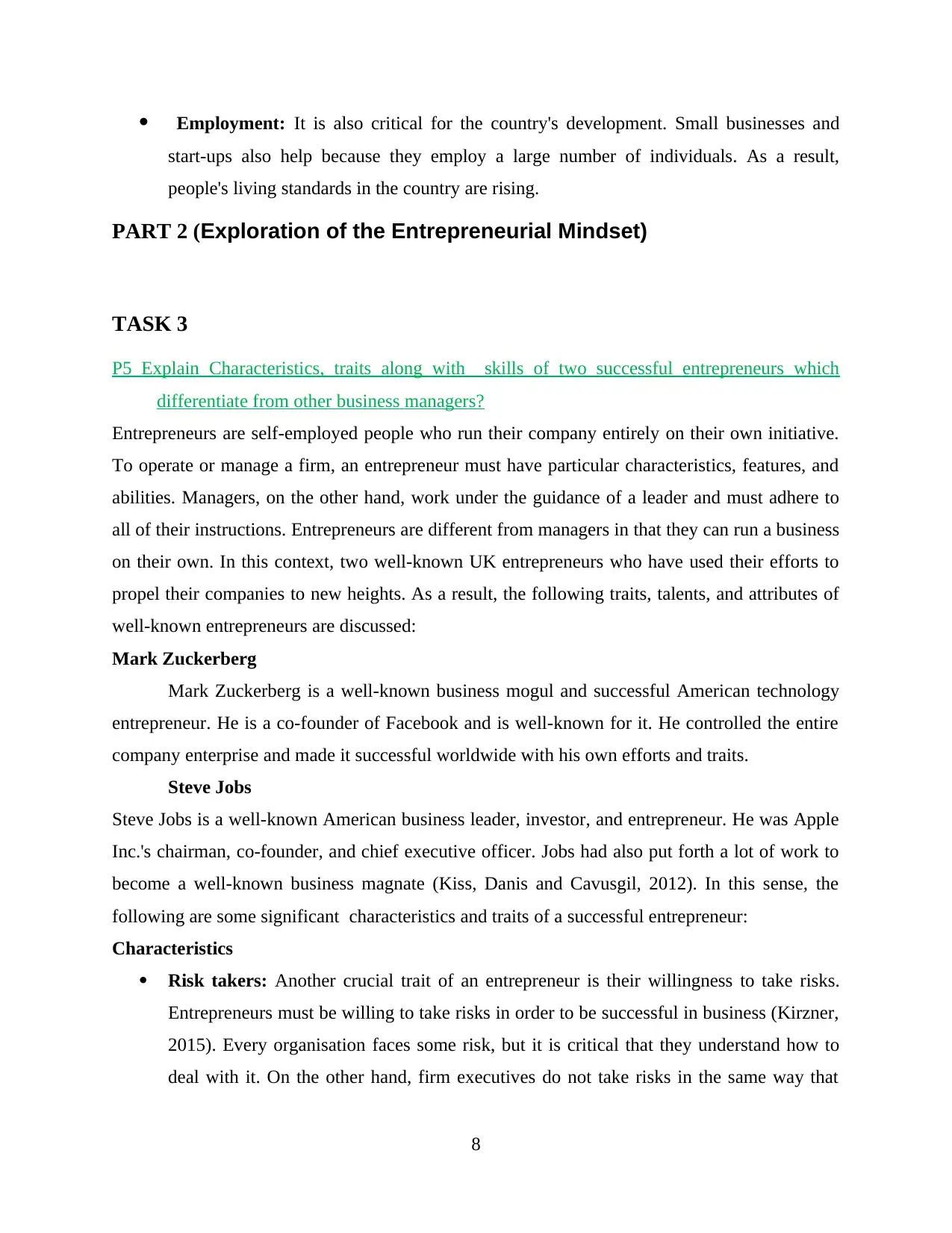
Employment: It is also critical for the country's development. Small businesses and
start-ups also help because they employ a large number of individuals. As a result,
people's living standards in the country are rising.
PART 2 (Exploration of the Entrepreneurial Mindset)
TASK 3
P5 Explain Characteristics, traits along with skills of two successful entrepreneurs which
differentiate from other business managers?
Entrepreneurs are self-employed people who run their company entirely on their own initiative.
To operate or manage a firm, an entrepreneur must have particular characteristics, features, and
abilities. Managers, on the other hand, work under the guidance of a leader and must adhere to
all of their instructions. Entrepreneurs are different from managers in that they can run a business
on their own. In this context, two well-known UK entrepreneurs who have used their efforts to
propel their companies to new heights. As a result, the following traits, talents, and attributes of
well-known entrepreneurs are discussed:
Mark Zuckerberg
Mark Zuckerberg is a well-known business mogul and successful American technology
entrepreneur. He is a co-founder of Facebook and is well-known for it. He controlled the entire
company enterprise and made it successful worldwide with his own efforts and traits.
Steve Jobs
Steve Jobs is a well-known American business leader, investor, and entrepreneur. He was Apple
Inc.'s chairman, co-founder, and chief executive officer. Jobs had also put forth a lot of work to
become a well-known business magnate (Kiss, Danis and Cavusgil, 2012). In this sense, the
following are some significant characteristics and traits of a successful entrepreneur:
Characteristics
Risk takers: Another crucial trait of an entrepreneur is their willingness to take risks.
Entrepreneurs must be willing to take risks in order to be successful in business (Kirzner,
2015). Every organisation faces some risk, but it is critical that they understand how to
deal with it. On the other hand, firm executives do not take risks in the same way that
8
start-ups also help because they employ a large number of individuals. As a result,
people's living standards in the country are rising.
PART 2 (Exploration of the Entrepreneurial Mindset)
TASK 3
P5 Explain Characteristics, traits along with skills of two successful entrepreneurs which
differentiate from other business managers?
Entrepreneurs are self-employed people who run their company entirely on their own initiative.
To operate or manage a firm, an entrepreneur must have particular characteristics, features, and
abilities. Managers, on the other hand, work under the guidance of a leader and must adhere to
all of their instructions. Entrepreneurs are different from managers in that they can run a business
on their own. In this context, two well-known UK entrepreneurs who have used their efforts to
propel their companies to new heights. As a result, the following traits, talents, and attributes of
well-known entrepreneurs are discussed:
Mark Zuckerberg
Mark Zuckerberg is a well-known business mogul and successful American technology
entrepreneur. He is a co-founder of Facebook and is well-known for it. He controlled the entire
company enterprise and made it successful worldwide with his own efforts and traits.
Steve Jobs
Steve Jobs is a well-known American business leader, investor, and entrepreneur. He was Apple
Inc.'s chairman, co-founder, and chief executive officer. Jobs had also put forth a lot of work to
become a well-known business magnate (Kiss, Danis and Cavusgil, 2012). In this sense, the
following are some significant characteristics and traits of a successful entrepreneur:
Characteristics
Risk takers: Another crucial trait of an entrepreneur is their willingness to take risks.
Entrepreneurs must be willing to take risks in order to be successful in business (Kirzner,
2015). Every organisation faces some risk, but it is critical that they understand how to
deal with it. On the other hand, firm executives do not take risks in the same way that
8
⊘ This is a preview!⊘
Do you want full access?
Subscribe today to unlock all pages.

Trusted by 1+ million students worldwide
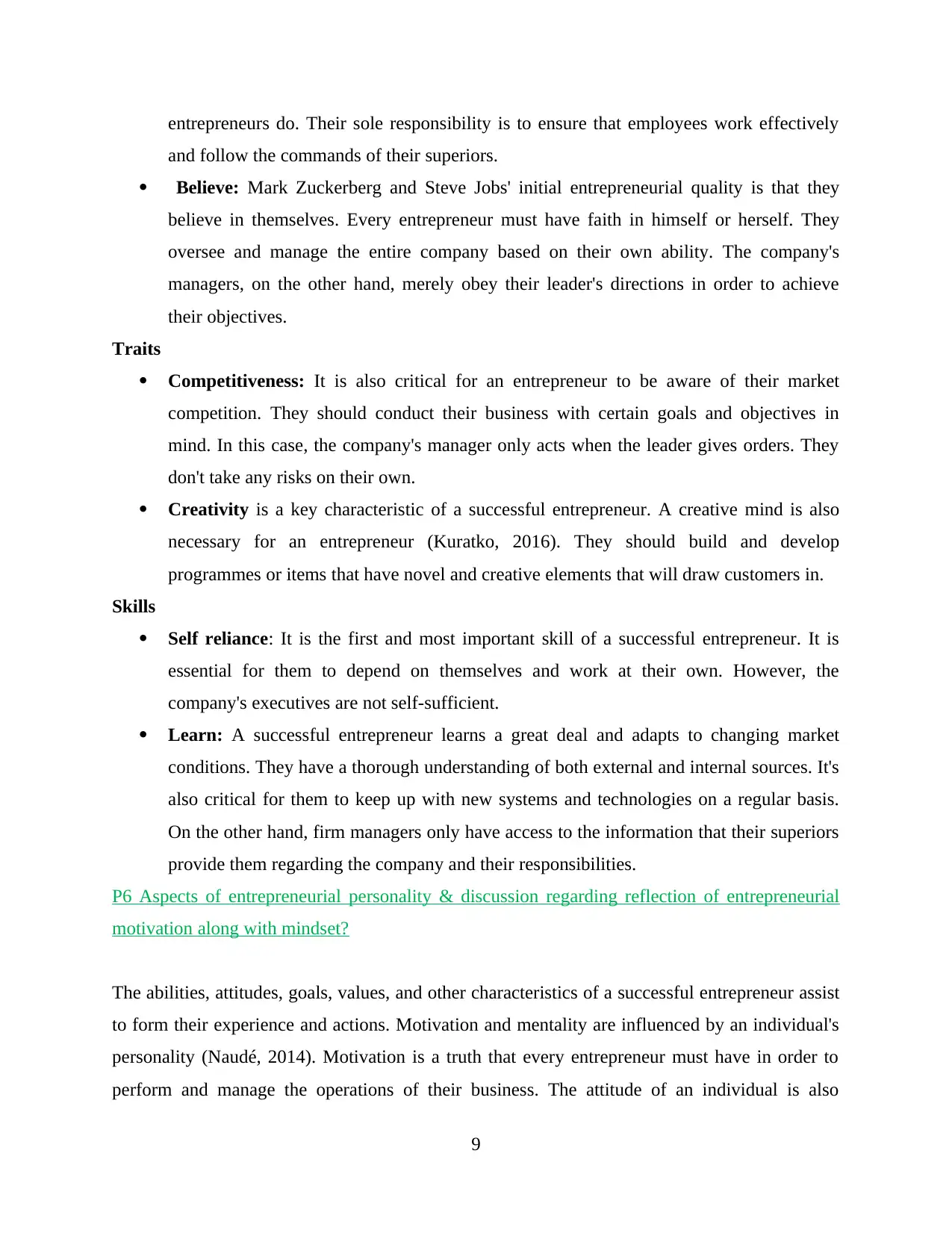
entrepreneurs do. Their sole responsibility is to ensure that employees work effectively
and follow the commands of their superiors.
Believe: Mark Zuckerberg and Steve Jobs' initial entrepreneurial quality is that they
believe in themselves. Every entrepreneur must have faith in himself or herself. They
oversee and manage the entire company based on their own ability. The company's
managers, on the other hand, merely obey their leader's directions in order to achieve
their objectives.
Traits
Competitiveness: It is also critical for an entrepreneur to be aware of their market
competition. They should conduct their business with certain goals and objectives in
mind. In this case, the company's manager only acts when the leader gives orders. They
don't take any risks on their own.
Creativity is a key characteristic of a successful entrepreneur. A creative mind is also
necessary for an entrepreneur (Kuratko, 2016). They should build and develop
programmes or items that have novel and creative elements that will draw customers in.
Skills
Self reliance: It is the first and most important skill of a successful entrepreneur. It is
essential for them to depend on themselves and work at their own. However, the
company's executives are not self-sufficient.
Learn: A successful entrepreneur learns a great deal and adapts to changing market
conditions. They have a thorough understanding of both external and internal sources. It's
also critical for them to keep up with new systems and technologies on a regular basis.
On the other hand, firm managers only have access to the information that their superiors
provide them regarding the company and their responsibilities.
P6 Aspects of entrepreneurial personality & discussion regarding reflection of entrepreneurial
motivation along with mindset?
The abilities, attitudes, goals, values, and other characteristics of a successful entrepreneur assist
to form their experience and actions. Motivation and mentality are influenced by an individual's
personality (Naudé, 2014). Motivation is a truth that every entrepreneur must have in order to
perform and manage the operations of their business. The attitude of an individual is also
9
and follow the commands of their superiors.
Believe: Mark Zuckerberg and Steve Jobs' initial entrepreneurial quality is that they
believe in themselves. Every entrepreneur must have faith in himself or herself. They
oversee and manage the entire company based on their own ability. The company's
managers, on the other hand, merely obey their leader's directions in order to achieve
their objectives.
Traits
Competitiveness: It is also critical for an entrepreneur to be aware of their market
competition. They should conduct their business with certain goals and objectives in
mind. In this case, the company's manager only acts when the leader gives orders. They
don't take any risks on their own.
Creativity is a key characteristic of a successful entrepreneur. A creative mind is also
necessary for an entrepreneur (Kuratko, 2016). They should build and develop
programmes or items that have novel and creative elements that will draw customers in.
Skills
Self reliance: It is the first and most important skill of a successful entrepreneur. It is
essential for them to depend on themselves and work at their own. However, the
company's executives are not self-sufficient.
Learn: A successful entrepreneur learns a great deal and adapts to changing market
conditions. They have a thorough understanding of both external and internal sources. It's
also critical for them to keep up with new systems and technologies on a regular basis.
On the other hand, firm managers only have access to the information that their superiors
provide them regarding the company and their responsibilities.
P6 Aspects of entrepreneurial personality & discussion regarding reflection of entrepreneurial
motivation along with mindset?
The abilities, attitudes, goals, values, and other characteristics of a successful entrepreneur assist
to form their experience and actions. Motivation and mentality are influenced by an individual's
personality (Naudé, 2014). Motivation is a truth that every entrepreneur must have in order to
perform and manage the operations of their business. The attitude of an individual is also
9
Paraphrase This Document
Need a fresh take? Get an instant paraphrase of this document with our AI Paraphraser
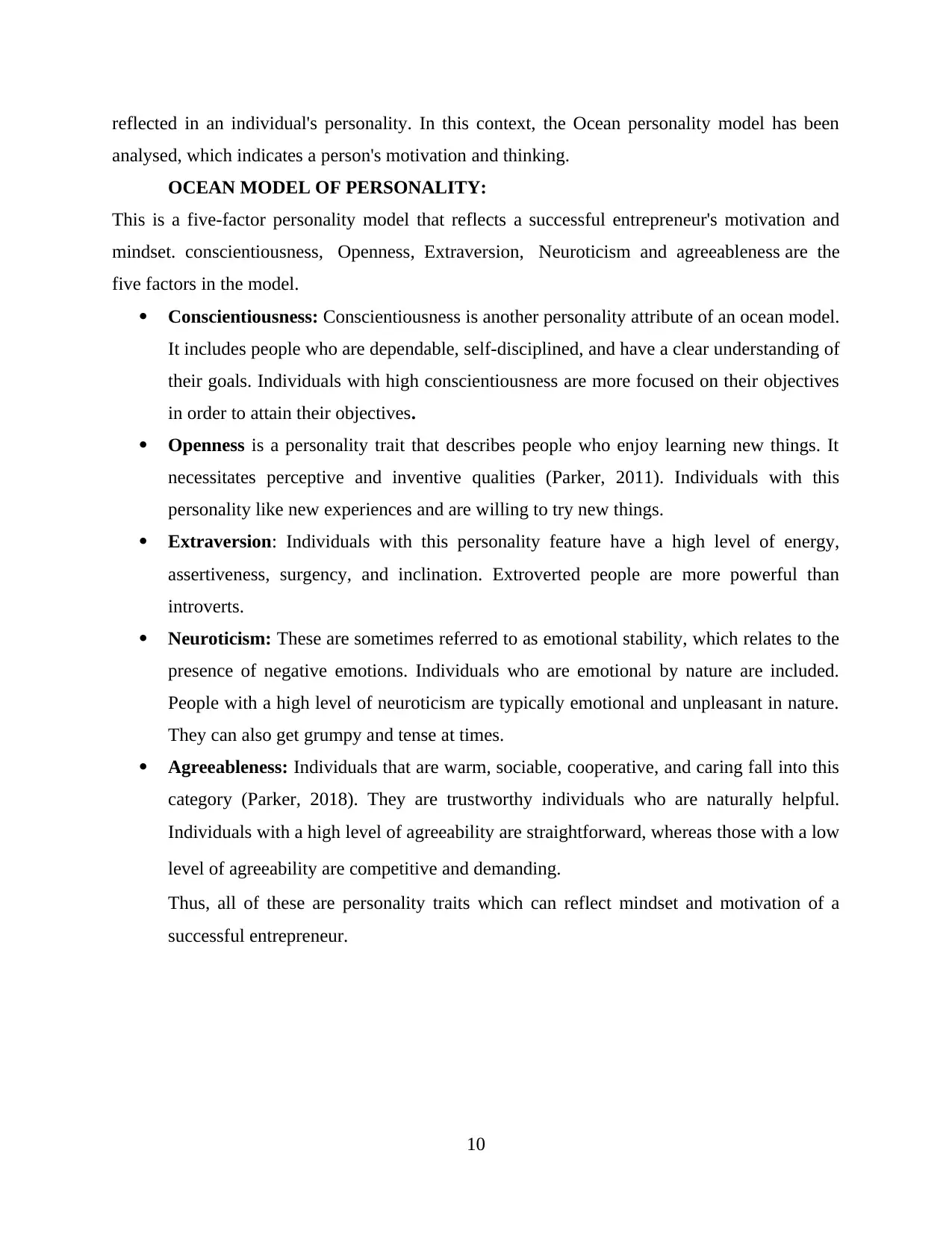
reflected in an individual's personality. In this context, the Ocean personality model has been
analysed, which indicates a person's motivation and thinking.
OCEAN MODEL OF PERSONALITY:
This is a five-factor personality model that reflects a successful entrepreneur's motivation and
mindset. conscientiousness, Openness, Extraversion, Neuroticism and agreeableness are the
five factors in the model.
Conscientiousness: Conscientiousness is another personality attribute of an ocean model.
It includes people who are dependable, self-disciplined, and have a clear understanding of
their goals. Individuals with high conscientiousness are more focused on their objectives
in order to attain their objectives.
Openness is a personality trait that describes people who enjoy learning new things. It
necessitates perceptive and inventive qualities (Parker, 2011). Individuals with this
personality like new experiences and are willing to try new things.
Extraversion: Individuals with this personality feature have a high level of energy,
assertiveness, surgency, and inclination. Extroverted people are more powerful than
introverts.
Neuroticism: These are sometimes referred to as emotional stability, which relates to the
presence of negative emotions. Individuals who are emotional by nature are included.
People with a high level of neuroticism are typically emotional and unpleasant in nature.
They can also get grumpy and tense at times.
Agreeableness: Individuals that are warm, sociable, cooperative, and caring fall into this
category (Parker, 2018). They are trustworthy individuals who are naturally helpful.
Individuals with a high level of agreeability are straightforward, whereas those with a low
level of agreeability are competitive and demanding.
Thus, all of these are personality traits which can reflect mindset and motivation of a
successful entrepreneur.
10
analysed, which indicates a person's motivation and thinking.
OCEAN MODEL OF PERSONALITY:
This is a five-factor personality model that reflects a successful entrepreneur's motivation and
mindset. conscientiousness, Openness, Extraversion, Neuroticism and agreeableness are the
five factors in the model.
Conscientiousness: Conscientiousness is another personality attribute of an ocean model.
It includes people who are dependable, self-disciplined, and have a clear understanding of
their goals. Individuals with high conscientiousness are more focused on their objectives
in order to attain their objectives.
Openness is a personality trait that describes people who enjoy learning new things. It
necessitates perceptive and inventive qualities (Parker, 2011). Individuals with this
personality like new experiences and are willing to try new things.
Extraversion: Individuals with this personality feature have a high level of energy,
assertiveness, surgency, and inclination. Extroverted people are more powerful than
introverts.
Neuroticism: These are sometimes referred to as emotional stability, which relates to the
presence of negative emotions. Individuals who are emotional by nature are included.
People with a high level of neuroticism are typically emotional and unpleasant in nature.
They can also get grumpy and tense at times.
Agreeableness: Individuals that are warm, sociable, cooperative, and caring fall into this
category (Parker, 2018). They are trustworthy individuals who are naturally helpful.
Individuals with a high level of agreeability are straightforward, whereas those with a low
level of agreeability are competitive and demanding.
Thus, all of these are personality traits which can reflect mindset and motivation of a
successful entrepreneur.
10
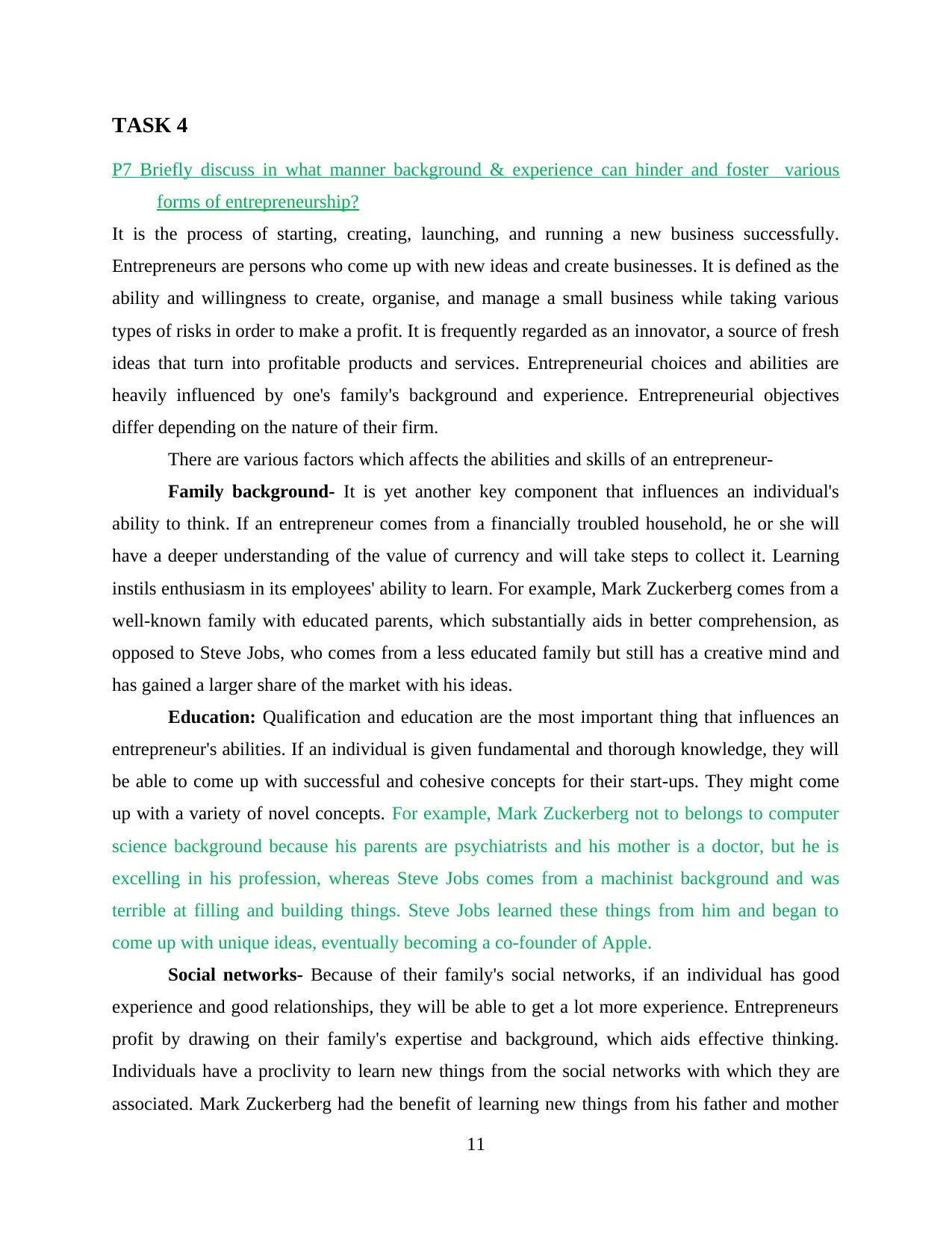
TASK 4
P7 Briefly discuss in what manner background & experience can hinder and foster various
forms of entrepreneurship?
It is the process of starting, creating, launching, and running a new business successfully.
Entrepreneurs are persons who come up with new ideas and create businesses. It is defined as the
ability and willingness to create, organise, and manage a small business while taking various
types of risks in order to make a profit. It is frequently regarded as an innovator, a source of fresh
ideas that turn into profitable products and services. Entrepreneurial choices and abilities are
heavily influenced by one's family's background and experience. Entrepreneurial objectives
differ depending on the nature of their firm.
There are various factors which affects the abilities and skills of an entrepreneur-
Family background- It is yet another key component that influences an individual's
ability to think. If an entrepreneur comes from a financially troubled household, he or she will
have a deeper understanding of the value of currency and will take steps to collect it. Learning
instils enthusiasm in its employees' ability to learn. For example, Mark Zuckerberg comes from a
well-known family with educated parents, which substantially aids in better comprehension, as
opposed to Steve Jobs, who comes from a less educated family but still has a creative mind and
has gained a larger share of the market with his ideas.
Education: Qualification and education are the most important thing that influences an
entrepreneur's abilities. If an individual is given fundamental and thorough knowledge, they will
be able to come up with successful and cohesive concepts for their start-ups. They might come
up with a variety of novel concepts. For example, Mark Zuckerberg not to belongs to computer
science background because his parents are psychiatrists and his mother is a doctor, but he is
excelling in his profession, whereas Steve Jobs comes from a machinist background and was
terrible at filling and building things. Steve Jobs learned these things from him and began to
come up with unique ideas, eventually becoming a co-founder of Apple.
Social networks- Because of their family's social networks, if an individual has good
experience and good relationships, they will be able to get a lot more experience. Entrepreneurs
profit by drawing on their family's expertise and background, which aids effective thinking.
Individuals have a proclivity to learn new things from the social networks with which they are
associated. Mark Zuckerberg had the benefit of learning new things from his father and mother
11
P7 Briefly discuss in what manner background & experience can hinder and foster various
forms of entrepreneurship?
It is the process of starting, creating, launching, and running a new business successfully.
Entrepreneurs are persons who come up with new ideas and create businesses. It is defined as the
ability and willingness to create, organise, and manage a small business while taking various
types of risks in order to make a profit. It is frequently regarded as an innovator, a source of fresh
ideas that turn into profitable products and services. Entrepreneurial choices and abilities are
heavily influenced by one's family's background and experience. Entrepreneurial objectives
differ depending on the nature of their firm.
There are various factors which affects the abilities and skills of an entrepreneur-
Family background- It is yet another key component that influences an individual's
ability to think. If an entrepreneur comes from a financially troubled household, he or she will
have a deeper understanding of the value of currency and will take steps to collect it. Learning
instils enthusiasm in its employees' ability to learn. For example, Mark Zuckerberg comes from a
well-known family with educated parents, which substantially aids in better comprehension, as
opposed to Steve Jobs, who comes from a less educated family but still has a creative mind and
has gained a larger share of the market with his ideas.
Education: Qualification and education are the most important thing that influences an
entrepreneur's abilities. If an individual is given fundamental and thorough knowledge, they will
be able to come up with successful and cohesive concepts for their start-ups. They might come
up with a variety of novel concepts. For example, Mark Zuckerberg not to belongs to computer
science background because his parents are psychiatrists and his mother is a doctor, but he is
excelling in his profession, whereas Steve Jobs comes from a machinist background and was
terrible at filling and building things. Steve Jobs learned these things from him and began to
come up with unique ideas, eventually becoming a co-founder of Apple.
Social networks- Because of their family's social networks, if an individual has good
experience and good relationships, they will be able to get a lot more experience. Entrepreneurs
profit by drawing on their family's expertise and background, which aids effective thinking.
Individuals have a proclivity to learn new things from the social networks with which they are
associated. Mark Zuckerberg had the benefit of learning new things from his father and mother
11
⊘ This is a preview!⊘
Do you want full access?
Subscribe today to unlock all pages.

Trusted by 1+ million students worldwide
1 out of 15
Related Documents
Your All-in-One AI-Powered Toolkit for Academic Success.
+13062052269
info@desklib.com
Available 24*7 on WhatsApp / Email
![[object Object]](/_next/static/media/star-bottom.7253800d.svg)
Unlock your academic potential
Copyright © 2020–2026 A2Z Services. All Rights Reserved. Developed and managed by ZUCOL.




